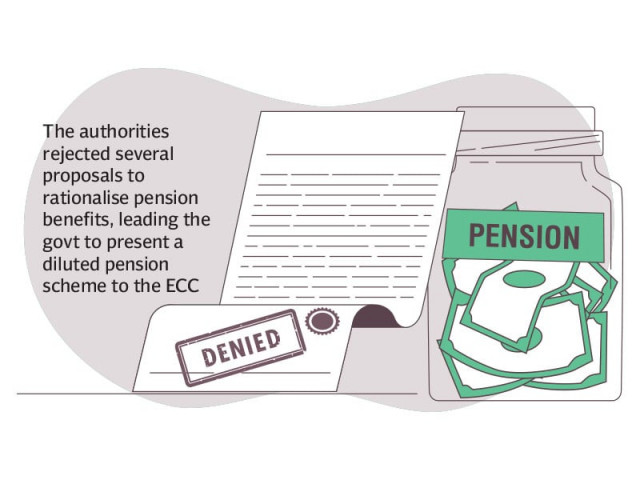ECC defers pension cuts on legalities
Okays new scheme for civilians; pension bill now 4th-largest budget expense

The government on Thursday deferred approval of pension cuts for existing pensioners due to questions about its legal mandate. However, it greenlighted a contributory pension scheme for new civilian employees, starting immediately, and for military personnel, starting next year.
The military authorities did not agree to several proposals to rationalise pension benefits, leading the government to present a diluted pension scheme at the Economic Coordination Committee (ECC) meeting. The ECC deferred even this diluted scheme after some members questioned the ECC’s jurisdiction over decisions requiring legal and regulatory changes.
Finance Minister Muhammad Aurangzeb chaired the ECC meeting, which decided that the federal government would cover average 15% losses banks might face on Rs560 billion lent to Small and Medium Enterprises (SMEs) over the next ten years. The ECC approved covering Rs84 billion in projected losses from 2024 to 2034 and sanctioned nearly Rs39 billion in supplementary grants just days before the fiscal year’s end.
Pension scheme
The finance ministry presented a compromised version of the new pension scheme for ECC approval, based on input from the General Headquarters (GHQ) and the Establishment Division. The proposed package excluded major elements that could have led to substantial savings for the government. The annual pension bill is now the fourth-largest budget expense, following interest payments, defence, and development spending.
Government officials indicated that even if the ECC approved the diluted scheme, the estimated first-year savings would be only Rs4 billion, or 0.4% of the next fiscal year’s pension allocation. Some ECC members argued that neither the finance ministry nor the federal cabinet had the mandate to alter existing employee benefits, suggesting the matter could end up in court.
Due to objections from the military and the Establishment Division, the finance ministry dropped the proposal to reduce commutation from 35% to 25%. The military also rejected calculating pensions based on the last three years’ average pay, agreeing instead to use the last two years’ average pay, pending legal approval.
An agreement was reached to impose a 3% per annum penalty for early retirement after 25 years of service, not affecting the military. The government proposed future pension increases based on the net pension authorised at retirement, while the military wanted increases tied to 100% of the average inflation rate over the last two years. A consensus was reached for future increases based on 80% of the last two years’ average inflation rate.
The finance ministry suggested limiting pension benefits to the third family tier for only ten years after the deaths of the pensioner and spouse, excluding families of martyred persons. The government also proposed that re-employed pensioners choose between salary and pension benefits, applicable only after age 60. The proposal to eliminate multiple pensions was shelved, allowing them to continue for the spouse’s lifetime.
The Establishment Division opposed reducing pensionable emoluments to 70% of the last three years’ average and the 3% penalty clause. It suggested raising the retirement age to 62 instead of cutting benefits.
Despite these challenges, the ECC approved establishing a Pension Fund using savings from benefit reductions and introduced a contributory pension for new entrants, starting next month for civilian employees and July 2025 for military personnel.
The ECC sanctioned an Rs8.6 billion supplementary grant for pension needs, including Rs7.7 billion for military pensions. The annual pension budget increased from Rs801 billion to Rs886 billion, with military pensions rising from Rs563 billion to Rs647 billion. For the next fiscal year, the government allocated Rs1.014 trillion for both military and civilian pensions.
SME scheme
The ECC approved the Risk Coverage Scheme for SMEs, covering average 15% losses banks might incur from lending to small and medium-sized companies. It sanctioned 20% risk coverage for small firms, requiring Rs56 billion over ten years, and 10% coverage for medium-sized companies, needing Rs28 billion over the same period. For the coming fiscal year, the ECC endorsed a Rs2 billion allocation for this purpose.
Return of USF funds
The ECC approved returning Rs11.1 billion to the Universal Services Fund (USF) from the remaining Rs61 billion, including the research and development budget. The Ministry of Information Technology requested the funds back due to a court case and to meet IT-related project needs of telecommunication companies. Previously, Rs5 billion had been diverted from the USF to the social media firewall project.
Other approvals
The government approved supplementary grants worth Rs4.3 billion for the Federal Board of Revenue (FBR). The ECC also sanctioned Rs12.1 billion for Sindh government dues and Rs7.9 billion for clearing 7th Population Census dues.



















COMMENTS
Comments are moderated and generally will be posted if they are on-topic and not abusive.
For more information, please see our Comments FAQ